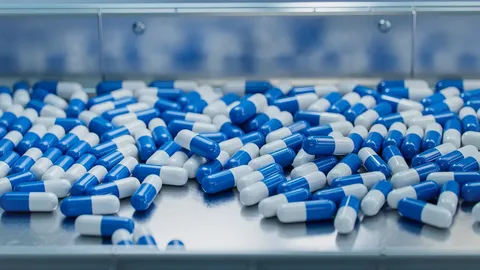Capsules are one of the most commonly used forms of pharmaceutical and dietary supplement delivery, known for their ease of consumption, precision in dosing, and versatile formulation options. As the demand for supplements and medications continues to grow globally, the capsule manufacturing industry has become increasingly important. This article explores the capsule manufacturing process, the different types of capsules, and key factors that influence production, helping businesses make informed decisions for their needs.
Understanding Capsule Manufacturing
Capsule Manufacturing involves the production of small containers made of either gelatin or plant-based materials that hold powdered or liquid ingredients. The process can be divided into several stages, each requiring careful attention to ensure the final product meets quality and regulatory standards.
Types of Capsules
There are two primary types of capsules used in the manufacturing process:
Hard Gelatin Capsules
These are the most common type and are used to encase powder-based formulations, such as herbal supplements and pharmaceuticals. They are typically made from animal-derived gelatin but can also be produced from vegetarian-friendly alternatives like hypromellose.
Soft Gel Capsules
These capsules are primarily used to contain liquids, oils, or pastes, offering a unique option for formulations that are difficult to powder. They are made by combining gelatin and plasticizers like glycerin, which gives them their soft and flexible texture.
The Capsule Manufacturing Process
The capsule manufacturing process can be broadly divided into the following steps:
Formulation Development
The first step in capsule manufacturing is the development of the formulation, which involves selecting the appropriate active ingredients, excipients, and additives that will be encapsulated. This step is crucial for ensuring the effectiveness, stability, and bioavailability of the product.
Preparation of Capsule Shells
The next step is the production of the capsule shells, which are typically made from either gelatin or vegetarian alternatives. In the case of hard gelatin capsules, the process involves dissolving the gelatin in hot water and then cooling it into thin sheets, which are then molded into the desired shape and size.
For soft gel capsules, the process involves combining the gelatin with plasticizers and other materials, followed by heating, cooling, and molding into soft, flexible shells that will hold the liquid fill.
Filling the Capsules
Once the capsule shells are prepared, the next step is to fill them with the active ingredients. For hard capsules, this involves the accurate filling of the capsules with powder using machines that can precisely measure the amount of product in each capsule. Soft gel capsules, on the other hand, are filled with liquids or gels, which are sealed within the shell to prevent leakage.
Sealing and Inspection
After the capsules are filled, they go through a sealing process to ensure that the ingredients remain enclosed within the capsule. This step is critical for maintaining the stability and integrity of the product. Capsules are then inspected for any defects, such as leaks or improper sealing, which could affect the quality of the product.
Drying and Packaging
Once the capsules have been sealed and inspected, they undergo a drying process to remove any excess moisture, which can cause degradation of the active ingredients. Finally, the capsules are packaged into bottles or blister packs, labeled according to regulatory requirements, and ready for distribution.
Benefits of Capsule Manufacturing
Capsule manufacturing offers several benefits that make it a preferred choice in the pharmaceutical and dietary supplement industries:
Accurate Dosing
Capsules provide precise dosages, ensuring that consumers receive the correct amount of active ingredients in every serving.
Versatility
Capsules can hold a wide variety of ingredients, from powders to liquids and oils, offering flexibility for manufacturers and formulators.
Improved Stability
Capsules help protect sensitive ingredients from light, air, and moisture, ensuring the stability and efficacy of the product over time.
Ease of Consumption
Capsules are easy to swallow and can mask unpleasant tastes or odors of certain ingredients, improving consumer acceptance.
Rapid Absorption
Some types of capsules, particularly soft gels, can enhance the bioavailability of active ingredients, allowing for faster absorption into the bloodstream.
Considerations for Capsule Manufacturing
While capsule manufacturing has numerous benefits, there are also key considerations that businesses need to keep in mind:
Material Selection
The choice between gelatin and plant-based alternatives is an important decision. While gelatin is commonly used, plant-based materials are gaining popularity due to the growing demand for vegetarian and vegan products.
Regulatory Compliance
Capsule manufacturers must ensure that their products comply with local and international regulations, including those related to good manufacturing practices (GMP), safety, and quality control.
Equipment Investment
Capsule manufacturing requires specialized machinery for filling, sealing, and inspecting the capsules. Investing in high-quality, reliable equipment is essential for maintaining product quality and efficiency.
Formulation Stability
Some active ingredients may be sensitive to heat, light, or moisture, so it’s crucial to select the right capsule type and materials to protect the ingredients from degradation.
Cost Efficiency
While capsule manufacturing is generally cost-effective, manufacturers need to carefully balance quality with production costs to ensure competitive pricing in the market.
Key Trends in Capsule Manufacturing
As the demand for capsules continues to grow, manufacturers are increasingly focusing on the following trends:
Vegetarian and Vegan Capsules
With the rise of plant-based diets, there is an increasing demand for vegetarian and vegan-friendly capsule alternatives, which are made from materials like HPMC (Hydroxypropyl Methylcellulose) or pullulan.
Sustainable Packaging
Sustainability is becoming a top priority for many manufacturers, leading to the development of eco-friendly capsule materials and packaging options.
Personalized Supplements
Advances in technology are allowing for more personalized supplement options, including capsules tailored to individual health needs and preferences.
Conclusion
Capsule manufacturing plays a vital role in the pharmaceutical and dietary supplement industries, offering a reliable and efficient way to deliver active ingredients. By understanding the various steps involved in the process, the benefits of capsule use, and the key considerations for production, businesses can make informed decisions to optimize their manufacturing operations and meet the growing demand for capsules in the market.



